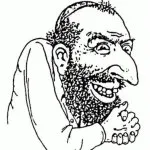Notes for 12.5: SA was the Nazi paramilitary force Law against establishment of parties Law for Restoration of the Professional Civil Service Long Knives Army Lebensraum Expansionist policies to gain German land At Hossbach conference, the top Generals disagreed with him
Cult of Personality Propaganda showing he was the Fuhrer who represented the German union and will act in the interests of Germany, rather than being selfish and petty. All powerful and all knowing Controlled press through censorship and allowing the Nazi publishing house, Eher Verlag, to buy up private newspapers until 1939 when it controlled ⅔ of the press Publishers could be prosecuted for publishing unapproved material Usage of radio in workplaces, shops, cafes, and blocks of flats with speeches through the loudspeakers for everyone to hear, as well as the home radio. Slogans, posters, and the salute with the greeting of ‘heil hitler’ Cinema with censored and degenerate things being filtered out. All cinema had to be Nazi approved to air Concert halls bedecked with swastikas, meetings, rallies, festivals, and such to celebrate Hitler’s birthday and chancellor anniversary
Characteristics of the Government Political authority over every aspect of German life The party being inseparably linked with the state Party membership essential to succeed in Germany Himmler, SS leader, took over the whole political police force All government positions were filled by Nazis, including the lawyers who had to study Nazi ideology Consequences of non-conformity, political, racial, or moral
Opposition The reading of banned literature, listening to foreign news, protection of Jews and other Nazi victims, and refusal to join Nazi organizations The youth listened to Jazz music or joined the Swing movement or Edelweiss Pirates Anti-Nazi jokes Brave socialists continuing to distribute anti-Nazi flyers Emigrating or joining the SPD in exile, Berlin Red Patrol, Hanover Socialist Front George Elser planted a bomb in a beer hall where Hitler was speaking and made him leave early. Underground cells in Berlin, Mannheim, Hamburg, and central Germany, from where leaflets against regime were issued Judges refusing to administer ‘Nazi’ justice and of churchmen such as Bishop Galen and Pastor Ditrich Bonhoeffer who spoke out against Nazi policies Groups were made to engage in discussion of the removal of Hitler, but broken up after the Gestapo stopped them Organized resistance in Universities and distribution of pamphlets about the treatment of Jews and Slavs Painting of anti-Nazi slogans on public buildings, but the members were caught and executed Around 225,000 Germans convicted of political crimes and 162,000 placed in prison without trial
|
13.1 Enabling Acts:
Reichstag Fire February 27, 1933 Reichstag (German parliament) was set on fire Nazis blamed the communist Marinus van der Lubbe Hitler asks Hindenberg for an emergency “Decree for the protection of people and state” Power to search Arrest and censor Until further notice
Education Religious education phased out Nazis anti-intellectual Compulsory youth organizations changed Prepare youth as soldiers and mothers Abolished class differences The only purpose of women were to have babies
Nazi Youth Dumb people don’t ask questions. Students had to reach a required standard in sport to move to the next class Sport was an examination subject for grammar school entry  Continual unsatisfactory in sport could = expulsion Germany's 1933 Law for the Protection of Genetically Diseased Offspring
Mass Media Controlled by the Ministry of Propaganda. Joseph Goebbels Books newspapers films censored Writers, artists and scholars who failed to express the opinion of the nazi teaching were attacked
Agencies of Coercion The SchutzStaffel SS Divided into three components Liebe Standard Hitlers Bodyguards Waffen SS the vanguard unit within the army (special ops) Totenkopfverbande “Death’s head” units which ran the concentration camps
The gestapo set up by Hydrick in 1933 was a political police force Both under the control of Heinrich Himmler  Coordination Campaign
Economic Changes In Nazi Germany Nazi Goal Mein Kampf (hitler indirectly caused this) insert kerosene)
Nazi Economic policies Schacht and the New Plan Dr Schacht was made Minister of the Economy in 1934, his aims were to reduce unemployment and Make germany self sufficient (autarky) Self sufficiency means no reliance on a foreign country Goring took over Economic policy from 1936 His four year plan dealt with preparing Germany for war. Regulation of imports and exports Autarky Rearmament Labor force with industrial skills Entire economy geared towards rearmament (total war) Goebbels developed a propaganda campaign to encourage workers to hep in the struggle for autarky
How did the nazis reduce unemployment National Labour service (RAD) From July 1935 it was compulsory for all men 18-25 to serve six months in the RAD. The men built autobahns and other large scale building projects This removed millions from the unemployment figures The RAD was not popular
Invisible Unemployment Women and jews were forced out of jobs Men aged 18-25 had to join the RAD Those serving in the military Opponents of the Nazi were sent to concentration camp
Rearmament The Four year plan meant the economy was geared to preparing for war. Rearmament created new jobs Billions spent on making weapons Army forces built up More the a million of official unemployment figures
The DAF (German Labour Front) Strength through joy Membership mandatory Trade union controlled by the state Purpose to control workers and push Nazi agenda Put people to work building Germany
Programs sponsored by DAF Cheap walking and skiing holidays Outings to opera and theater Adult evening classes Saving schemes to buy “people's car” VW Between 1936 and 1939 wages increased because of longer working hours People worked longer for the same money before the Wall St Crash Cost of living went up in the 1930’s real wages actually fell Food shortages
|
 Knowt
Knowt
